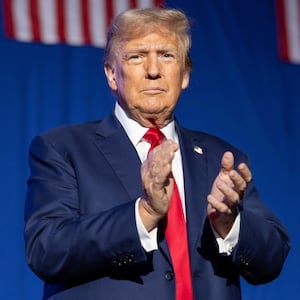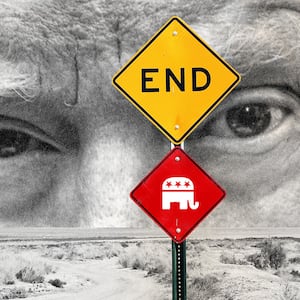DURHAM, New Hampshire—In his monthly stop in the first-in-the-nation primary state on Saturday, Donald Trump gave the crowd assembled at the University of New Hampshire’s arena almost exactly what Chris Christie predicted.
Christie said on Wednesday that the former president would fly in, “talk at you,” avoid taking any voter questions, rattle off his running list of grievances, and be wheels-up in a few hours.
It would be an insult to Granite State voters, according to Christie, who himself will be in New Hampshire close to full-time between Christmas and the Jan. 23 primary election.
But what Christie missed—what he missed eight years ago—is that Trump has already blown up the myth of the New Hampshire primary.
Gone are the days of presidential candidates doing the New Hampshire living room circuit, of voters shaking hands with each candidate—multiple times—and making a decision based on the state’s peculiar penchant for politicians who are less beholden to their parties and more preoccupied with having an actual personality.

Republican presidential candidate, former U.S. President Donald Trump speaks to supporters during a campaign event at the Whittemore Center Arena on December 16, 2023 in Durham, New Hampshire.
Scott Eisen/Getty ImagesIn 2016, Trump cast all of that aside and cruised to victory in the New Hampshire primary with some arena rallies and his MAGA cult of personality. This year, with the primary fast approaching, Trump’s fly-by-night operation in the state is doing even better with even less voter interaction.
A CBS poll over the weekend showed Trump holding first place in New Hampshire with 44 percent support, followed by Nikki Haley in second—the closest she’s been to Trump in any state thus far—at 29 percent.
Even if Haley could automatically steal Christie’s 10 percent in some sort of Never Trump osmosis, it still wouldn’t be enough to thwart Trump. And even if Haley could somehow pull off the upset—an unlikely outcome—Trump still has firewalls of support nationally.
Haley, like Christie, has been on the ground in New Hampshire for months, holding modest events conjuring the idyllic vision of retail politics that Granite State voters argue is essential to the presidential nominating process.
It likely won’t matter.
At this point in the cycle, it seems that no matter what Trump says, no matter how many times he’s indicted, nothing can touch him.
On Saturday, Trump gave the crowd a mostly rote performance: a mix of his greatest hits, and some new songs with explicitly authoritarian lyrics. He notably repeated his widely condemned line on immigrants “poisoning the blood of our country.” And his favorite dictators got their customary shoutouts.
Part of the reason Trump was able to circumvent the living room circuit is because Trump was already in those living rooms, factoring prominently on the news every night. The same is true now. Hardly anyone would say the problem with Trump is that they don’t know enough about him.
But as the former president largely ignores the traditional responsibilities of campaigning to sit in on a civil trial which he’s not obligated to attend, to rage about the same grievances he’s been raging about for years, and to golf, the myth of New Hampshire—that it was a state largely composed of independents who needed to look politicians in the eye and judge them by their handshake—is looking flimsier than ever.
Was New Hampshire ever the bastion of independents that voters claimed, or was it just splotches of dark blue surrounded by deep red Trump country?
“I was asking myself that question eight years ago,” said Dante Scala, a professor of political science at UNH who’s written multiple books on the primary.
Back then, it was a similar story with Trump: no diner visits, no town halls, no random voter questions.
Now, the interaction is even more minimal, and it’s once again not a factor. Yet Scala and other primary observers keep hearing the same conventional wisdom that proved catastrophically wrong in February 2016—that voters had been “flirting with Trump,” as Scala recalled, but when primary day comes, “voters will level up their scrutiny and he’ll fade like others have faded.”
It didn’t happen.
Instead, after Sen. Ted Cruz (R-TX) eked out a victory at the Iowa caucuses, New Hampshire reaffirmed the frontrunner status that Trump needed to propel himself to the GOP nomination and, eventually, the White House.
As longtime New Hampshire primary strategist Jim Merrill told The Daily Beast, it seemed to be a very different electorate from “the one that nominated Mitt Romney in 2012.”
Merrill would know, having led Romney’s 2012 bid and Marco Rubio’s 2016 New Hampshire effort.
Even though candidates like Haley and Christie have “done the boardroom round tables, the diners, the town halls in all corners of the state,” Merrill suggested the vintage New Hampshire strategy embodied by John McCain’s “Straight Talk Express” just isn’t enough to beat Trump.
“John McCain was a political celebrity,” Merrill said. “Donald Trump came in as a cultural celebrity.”
As Trump “bent the laws of political physics as we knew them,” Merrill added, the old guard of the New Hampshire GOP remained in denial over how much the landscape had shifted.
For one, independent voters in New Hampshire have long been similar to independent voters everywhere else, as Scala pointed out, settling into more distinct ideological tranches where many vote just like rank-and-file Democrats or Republicans.
“The myth about the independent voter is, I think their influence tends to be exaggerated to a significant degree, because they tend to be treated as one bloc of voters,” Scala said.
In truth, once those layers of partisan leaning independents are stripped away, Scala continued, “the reality is a lot more complicated, and because it’s a lot more complicated, they’re actually less influential.”
Where does that leave the Christies and Haleys of the world, banking on the few but proud independent voters—usually around a third of the electorate in the New Hampshire primary—and slivers of non-MAGA Republicans to give them a shot against Trump?
“When history is written and we have the benefit of context and time to look back,” Merrill said, “I think folks will see the Nikki Haley experience and say, here’s someone who made a commitment early on, who put boots on the ground, money in mailboxes and on-air… And now there’s at least a national conversation about Nikki Haley.”
Meanwhile, Ron DeSantis, might offer a useful case study in precisely how not to do it, Merill said.
A national conversation, for a New Hampshire exceptionalist like Merrill, is enough to hold him over—for now.
“I just think Trump is an outlier, and a very successful outlier,” the Romney and Rubio alum said. “But I’m not prepared to say New Hampshire is invalidated because the uniqueness of Trump has done something to it.”
Or, it’s less about what Trump did to New Hampshire than what the state always was all along.
“Trump did show how New Hampshire can be very prone to a populist, give-’em-hell, we’re-angry, send-a-message candidate,” Scala said.
“And that’s part of our history, too,” he added. “It’s just not the pretty version.”








